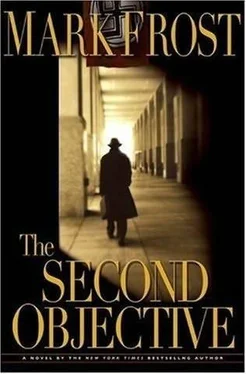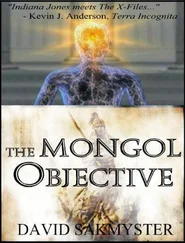Bernie had to brake suddenly to avoid slamming into a burned-out troop transport. A shell had hit the gas tank flush and the wheels had melted right onto the road. The charred corpses inside were impossible to identify as either German or American. They slowly drove around it and edged forward. Bernie thought he saw a line of men sprint across the road in front of them and disappear into the woods, but he couldn’t tell what uniforms they were wearing. Von Leinsdorf crouched in the passenger seat and raised his rifle. A volley of bullets whistled by them out of the fog from that direction and shattered the rearview mirror. Von Leinsdorf returned fire, emptying his clip. Bernie stepped on the gas, taking a chance that nothing else lay hidden ahead of them in the dense air.
At three in the morning they emerged onto a high rocky plain, and Von Leinsdorf directed Bernie to follow signs toward Bastogne. Artillery boomed in the distance and drew closer as they approached. They cleared a checkpoint outside the village and entered an entrenched stronghold in the middle of town. MPs directed them to central command for VIII Corps, and they parked around the corner. Rifle companies were digging in all around, fortifying positions for mortars and machine guns. Bernie changed field jackets, putting on one that bore the insignia of the 291st Engineers.
“Stay next to me,” said Von Leinsdorf. “Don’t talk to anybody.”
Holding up the document tube, Von Leinsdorf showed their new, corrected SHAEF security passes at the door, and they were sent toward the signal office. The command center, hastily thrown together in the middle of an old cathedral, hummed with frantic energy, officers shouting over one another. Housed in one of the chapels off the main nave, a battery of radio, telex, and telegraph operators relayed updated messages. Von Leinsdorf stood near the back and observed for a minute, getting a grasp of the command structure.
“Keep your head down,” said Von Leinsdorf. “Look busy.”
Bernie took out a pad and began to write. His hands could barely hold the pen. A signal corps sergeant barked at them as he walked past, gesturing at the document tube.
“You got something for us, Lieutenant?” he said.
“Already handed ’em off,” said Von Leinsdorf. “Waiting on dispatches for the Twelfth.”
“Don’t wait too long,” said the sergeant. “You might not get back out.”
Listening to the chatter, Bernie learned that German forces were advancing rapidly to the north and south of Bastogne. The mood in the room ran just short of panic that they were about to be overrun; Bernie felt it fire his overwrought nerves. Von Leinsdorf studied the radio operators. He picked out a small corporal who looked close to exhaustion, then moved toward him the next time he came off a call, holding up the document tube. He had to shout to be heard over the din in the room.
“God damn it, they told us General Bradley would be here,” said Von Leinsdorf. “I’ve got to get these into his hands.”
“Bradley? He was supposed to be here an hour ago, but we lost the main road between here and Luxembourg.”
“Christ, you’re telling me he’s not coming?”
“They might try to fly him in later, or get him back down to France. Ike wants both him and Patton for a pow-wow-”
“Where the hell’s that going to be?”
“Maybe Verdun, maybe in Paris, they haven’t said yet.”
“Well, when the fuck is it scheduled?”
Bernie moved closer, listening and watching Von Leinsdorf. His sudden interest in Bradley’s movements alarmed him.
“I don’t think before tomorrow, and you can forget about getting to Luxembourg before that, sir, the Krauts are swarming down there-”
“Then god damn it, Corporal, I’ve got to get into France today. I need to know which crossings are still open and if it’s gonna be Verdun or Paris as soon as you get word.”
“I’ll stay on it, sir.”
“Where’s your signal officer? I need the fucking passwords.”
“We were just about to put out today’s list,” he said.
“Well, don’t let me stop you,” said Von Leinsdorf.
As the radio operator went to work, Bernie saw Von Leinsdorf step back and assess whether he’d been overheard. Every man in the room was so caught up in his own corner of the war that no one paid any attention. Ten steps away, Bernie watched a group of officers knotted around a red-faced general, who was shouting angrily at them. A shell landed outside, close enough to shake dust from the ceiling and momentarily dim the lights. During the blackout, Von Leinsdorf brazenly snatched the password list from the operator’s desk-Bernie saw it in his hand when the lights came back on. Von Leinsdorf put it in his pocket, looked over, caught Bernie watching, and winked at him.
He’s crazy. He’s enjoying this.
Until he found a way to stop Von Leinsdorf, Bernie had resigned himself to the consequences of sabotage, reconnaissance, even espionage. That at least gave him a chance to avoid killing Americans.
Until that moment, assassination hadn’t even occurred to him.
The telex station behind where Bernie was standing jumped to life, startling him.
Bernie leaned forward to read the message as it came through. It was an urgent signal from First Army HQ in Liège. The headline identified it as an emergency override, the highest level of Allied security alert.
First Army Interrogation Center, Liège
DECEMBER 18, 4:00 A.M.
The contents of Karl Schmidt’s satchel, jeep, and pockets lay on the table between Schmidt and Major Moran from the 301st Counter Intelligence Corps Detachment. Schmidt’s wrists were in handcuffs, secured through the slats of the chair behind his back, and he still wore the undershirt and trousers of his American uniform. Major Moran asked questions, while Earl Grannit and a team of intelligence officers watched through a one-way observation window in an adjoining room. From there, a stenographer transcribed the conversation, which was conducted in English, although a translator was also present if the need for one arose. A wire tape recorder ran throughout the interview, so that when they reviewed and transcribed, no detail would be overlooked.
In a money belt concealed around his waist, Schmidt had carried $2000 in American currency, a thousand in counterfeit British pounds, and smaller amounts in Belgian, Dutch, and French notes and coins. American soldiers in Europe rarely carried cash and were instead issued printed scrip they called “invasion money,” a detail that had escaped the scrutiny of Skorzeny’s quartermaster. A shortwave military radio of German origin was found hidden in the back of Schmidt’s jeep. They also found ten Pervitin tablets-caffeine-based energy boosters-an assortment of concealed weapons, including brass knuckles, hand grenades, and a stiletto; an American officer’s field manual; and an English pocket-sized edition of the New Testament. Hidden in an empty fuel canister they found fuses, detonators, and six pounds of Nipolite, a malleable plastic explosive.
Other cans held four regulation German uniforms and a number of more exotic weapons, including a piano wire garrote and a silencer. Grannit took particular interest in the silencer, a silver cylinder that slid neatly over the barrel of Schmidt’s standard American issue M1911 automatic. It also fit onto the end of a compact machine pistol they found, which converted to an automatic rifle with the addition of an armatured stock and telescopic sight. Among the ammunition for it they found a clip of seven bullets containing a poisonous aconite compound encased in the head, which was scored to split upon contact, causing certain death.
Because of his forgery training, Ole Carlson worked with two officers to examine Schmidt’s collection of maps and documents. They included credible versions of the highest security passes issued by the Allied forces.
Читать дальше












